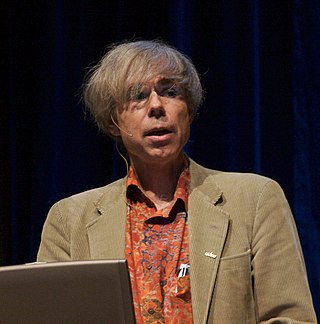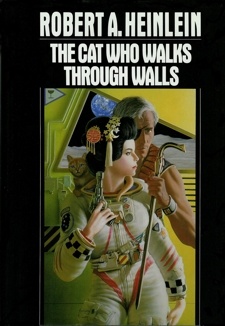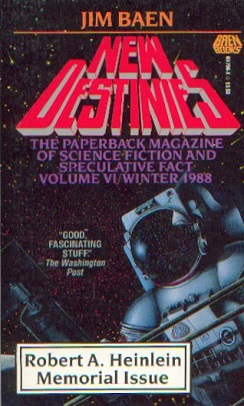Related Research Articles

Douglas Richard Hofstadter is an American cognitive and computer scientist whose research includes concepts such as the sense of self in relation to the external world, consciousness, analogy-making, strange loops, artificial intelligence, and discovery in mathematics and physics. His 1979 book Gödel, Escher, Bach: An Eternal Golden Braid won the Pulitzer Prize for general nonfiction, and a National Book Award for Science. His 2007 book I Am a Strange Loop won the Los Angeles Times Book Prize for Science and Technology.

Robert Anson Heinlein was an American science fiction author, aeronautical engineer, and naval officer. Sometimes called the "dean of science fiction writers", he was among the first to emphasize scientific accuracy in his fiction, and was thus a pioneer of the subgenre of hard science fiction. His published works, both fiction and non-fiction, express admiration for competence and emphasize the value of critical thinking. His plots often posed provocative situations which challenged conventional social mores. His work continues to have an influence on the science-fiction genre, and on modern culture more generally.

To Sail Beyond the Sunset is a science fiction novel by American writer Robert A. Heinlein, published in 1987. It was the last novel published before his death in 1988. The title is taken from the poem "Ulysses", by Alfred Tennyson. The stanza of which it is a part, quoted by a character in the novel, is as follows:

Stranger in a Strange Land is a 1961 science fiction novel by American author Robert A. Heinlein. It tells the story of Valentine Michael Smith, a human who comes to Earth in early adulthood after being born on the planet Mars and raised by Martians, and explores his interaction with and eventual transformation of Terran culture.

The Cat Who Walks Through Walls is a science fiction novel by American writer Robert A. Heinlein, published in 1985. Like many of his later novels, it features Lazarus Long and Jubal Harshaw as supporting characters.

Methuselah's Children is a science fiction novel by American writer Robert A. Heinlein. Originally serialized in Astounding Science Fiction in the July, August, and September 1941 issues, it was expanded into a full-length novel in 1958. The novel is part of Heinlein's Future History series of stories. It introduces the Howard families, a fictional group of people who achieved long lifespans through selective breeding.
"Life-Line" is a short story by American author Robert A. Heinlein. Published in the August 1939 edition of Astounding, it was Heinlein's first published short story.
"The Green Hills of Earth" is a science fiction short story by American writer Robert A. Heinlein. One of his Future History stories, the short story originally appeared in The Saturday Evening Post, and it was collected in The Green Hills of Earth. Heinlein selected the story for inclusion in the 1949 anthology My Best Science Fiction Story. "The Green Hills of Earth" is also the title of a song mentioned in several of Heinlein's novels.

The Number of the Beast is a science fiction novel by American writer Robert A. Heinlein, published in 1980. Excerpts from the novel were serialized in the magazine Omni.

Time Enough for Love is a science fiction novel by American writer Robert A. Heinlein, first published in 1973. The book made the shortlist for the Nebula, Hugo and Locus awards for best science fiction novel of that year, although it did not win. It did win a retrospective Libertarian Futurist Society award: the Prometheus Hall of Fame award for 1988.
Lazarus Long is a fictional character featured in a number of science fiction novels by American writer Robert A. Heinlein. Born in 1912 in the third generation of a selective breeding experiment run by the Ira Howard Foundation, Lazarus becomes unusually long-lived, living well over two thousand years with the aid of occasional rejuvenation treatments. Heinlein "patterned" Long on science fiction writer Edward E. Smith, mixed with Jack Williamson's fictional Giles Habibula.

The Future History is a series of stories created by Robert A. Heinlein. It describes a projected future of the human race from the middle of the 20th century through the early 23rd century. The term Future History was coined by John W. Campbell Jr. in the February 1941 issue of Astounding Science Fiction. Campbell published an early draft of Heinlein's chart of the series in the May 1941 issue.

In the Wake of Poseidon is the second studio album by English progressive rock group King Crimson, released in May 1970 by Island Records in Europe, Atlantic Records in the United States, Philips Records in Australia, and Vertigo Records in New Zealand. To date the album is their highest-charting in the UK, reaching number 4.

The Notebooks of Lazarus Long is a 1978 collection of aphorisms by Robert Heinlein's main character, "Lazarus Long", excerpted from his 1973 novel Time Enough for Love. The aphorisms were originally published as two "intermission" sections in the novel.
Hofstadter's law is a self-referential adage, coined by Douglas Hofstadter in his book Gödel, Escher, Bach: An Eternal Golden Braid (1979) to describe the widely experienced difficulty of accurately estimating the time it will take to complete tasks of substantial complexity:
Hofstadter's Law: It always takes longer than you expect, even when you take into account Hofstadter's Law.

Aposthia is a rare congenital condition in humans, in which the foreskin of the penis is missing.

New Destinies, Vol. VI/Winter 1988—Robert A. Heinlein Memorial Issue, edited by Jim Baen,.
Delos David Harriman, known as D.D. Harriman, is a character in the fiction of science fiction author Robert A. Heinlein. He is an entrepreneurial businessman who masterminded the first landing on the Moon as a private business venture. His story is part of Heinlein's Future History.

Maureen Johnson Smith Long most often referred to as Maureen Johnson, is a fictional character in several science fiction novels by American writer Robert A. Heinlein. She is the mother, lover, and eventual wife of Lazarus Long, the longest-living member of Heinlein's fictional Howard families. She is the only character from the "Lazarus Long cycle" to have an entire fictional memoir devoted to her life.
Tertius may refer to:
References
- ↑ Jon Fripp, Michael Fripp, Deborah Fripp, Speaking of Science (Newnes, 2000), ISBN 978-1878707512, p. 192. Excerpts available at Google Books.
- ↑ Arthur Bloch, Murphy's Law: the 26th Anniversary edition, (Penguin, 2003), ISBN 978-0399529306, p. 61. Excerpts available at Google Books.
- ↑ Robert A. Heinlein, Time Enough for Love (Penguin, 1988 reprint), ISBN 978-0441810765. Excerpts available at Google Books.